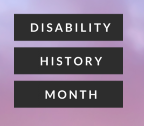1.
Jessica (she/her)
University of Sheffield, postgraduate student
How do you experience your disability/ies?
My disabilities are hidden disabilities (anxiety and depression). I see them as part of me but they are not all of me, so you could say I have a pretty positive view on them. Of course, I did have my trouble with them but through time and growth I have come to see the positive side of having mental health issues. They don’t really coincide with my other identities (athlete, student, female, teacher, researcher) since anyone and everyone can have mental health issues. I guess you could say I developed these over time — but when they began is what I am unsure about. The fact that they developed later in life doesn’t affect my view of my disabilities but lately I have been thinking about the time in my life when they did begin to develop. According to my diagnosis, it was around September/October 2019 but as I look more into anxiety symptoms, I realize I have had anxiety since I was around 12 years old (so, 10 years now) — a big difference than what my diagnosis says. My disabilities affect my interactions with strangers greatly, I have a difficult time making friends and meeting new people; although this has been getting easier overtime and as I learn to manage my anxiety. With family, it doesn’t really affect my interactions unless I have anxiety from the day built up and I have a panic attack around my family — this is basically the same with friends but my anxiety will cause me to cancel plans with friends last minute just because I am too anxious to go out or do much of anything.
How do you experience the word ‘disabled’?
I think the word ‘disabled’ has a negative connotation to it (given by society) but that is slowly changing. To me, it isn’t necessarily positive or negative, it just means there is something unique about you — so in that sense I would say positive! It is hard for me to say if I identify with the word ‘disabled,’ and I think that is because of how society has been while I grew up. In my mind, ‘disabled’ brings up something more physical than mental health issues tend to be. But I can see how others would see this differently — I am glad I can see both sides, this means that conversations are happening and we are starting to remove the stigma from disabilities. I believe my mental illnesses have empowered me, although they do frustrate me quite often. I feel as though knowing my diagnosis helps me to better take control of my feelings and mental health issues by taking the correct steps to gain better control of my anxiety and depression and the fits that come with them.
How do you relate to others within the disabled community?
I view myself as part of the ‘mental health issues’ community, which I think could be considered a subset of the disabled community. I do engage with other disabled people. Being on the committee for Mental Health Matters Society at Uni of Sheffield is one way I do that and I tend to make friends who have similar issues — we usually bond over similar anxious thoughts and feelings which allows us to talk about how we feel without judgement and find new ways to cope together. There can be a disabled community even though there are so many types of disabilities — it is one large community (the more the merrier)! Engaging with other disabled people does empower me because it shows me that I am not alone, that other people are fighting similar battles, that I have help, and most importantly: I have a safe space.
Does your disability define you?
My disability does not define me. Anxiety and depression are a part of who I am and something I deal with on a daily basis but they are not the only thing that creates me. I would say that my disability is a core part of me, it is something I have learned to live with each and every day — they all bring new and different challenges so I am always learning and growing.
If you enjoyed this article and would like to contribute your own, follow the link here for more information on how to do that. We welcome submission from all students and staff members that identify as disabled, neurodiverse, or as having a chronic illness.
